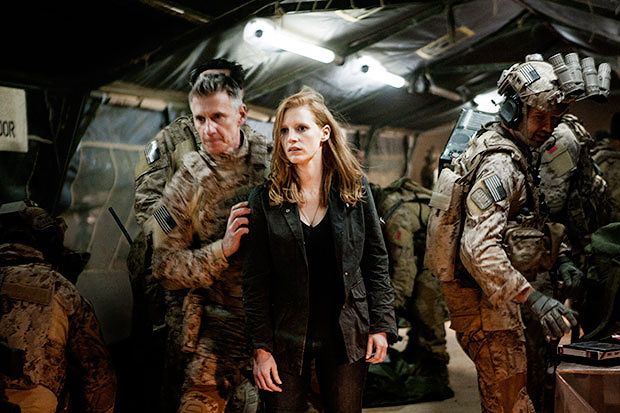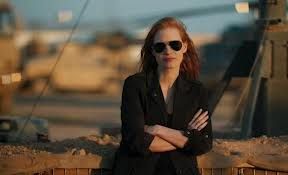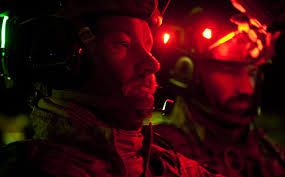Americans have had precious few public events to feel proud of in a long time. The mission to prong Osama bin Laden at his hideout in Pakistan was among those few. Zero Dark Thirty, based on the long search to locate and destroy the target, is -- thank goodness -- worthy of the exploit. In cinematic terms it succeeds as impressively as the CIA-military campaign that delivered death to bin Laden.
The film is complex and the storyline not always easy to follow. (If there was an explanation of the title, I missed it.) Hurray. It wasn't pitched at the lowest common denominator in the audience. The real hunt for bin Laden was surely messy, full of false leads and frustration; Zero Dark Thirty captures the near-incoherence that prevailed in the Middle East and presumably the CIA offices at Langley.
Whether the actual long-drawn-out reconnaissance and stealth helicopter attack were led by an obsessive CIA agent (Jessica Chastain) I know not. Nor do I care. This isn't a documentary, it's a dramatization, and damned effective.
The movie will undoubtedly make a Chastain a big star -- already has, I guess. And it's well deserved. She's on screen for a big chunk of the two-and-a-half-hour running time, and brings something new and appropriate to each scene. She draws you in.
The other actors, including those in supporting and brief roles, are bang on. One of the CIA guys is played by Mark Strong, an English actor you've seen in lots of TV dramas, but to listen to his accent here you'd never dream he's anything other than American.
Actors can save a weak script (which, this time, Mark Boal's isn't) and even make a floundering director seem good. But Kathryn Bigelow adds her own brand of star quality. She has a gift for striking visuals, a rare ability to make the familiar seem unfamiliar. The movie's texture is a wonder.
That might seem like faint praise, but it isn't. The production of a big-budget film is as artificial as can be. A scene usually begins as a handful of lines in a script. Chances are those lines are rewritten, and rewritten, and ... the scene is storyboarded. When it's time for the shoot, the set designers and costume designers and makeup people go to work, sometimes for hours while the actors do whatever they need to do to keep from going mental while waiting to project their lines. Movie scenes aren't usually rehearsed much, but recorded over and over again; the actors make the same moves, express the same expressions five, a dozen, or more times. It can be perfect and an extra sneezes; okay, that was great, let's do it again.
Under those circumstances, a director needs more than technical chops. He or she needs to understand the inner world of actors, how to motivate them to give their best time after time. I mean to pay Bigelow a high compliment indeed when I say that she makes this artificiality look and feel authentic.
I had mixed feelings about her previous The Hurt Locker, but she's eliminated the debits and kept the assets for Zero Dark Thirty.
That might seem like faint praise, but it isn't. The production of a big-budget film is as artificial as can be. A scene usually begins as a handful of lines in a script. Chances are those lines are rewritten, and rewritten, and ... the scene is storyboarded. When it's time for the shoot, the set designers and costume designers and makeup people go to work, sometimes for hours while the actors do whatever they need to do to keep from going mental while waiting to project their lines. Movie scenes aren't usually rehearsed much, but recorded over and over again; the actors make the same moves, express the same expressions five, a dozen, or more times. It can be perfect and an extra sneezes; okay, that was great, let's do it again.
Under those circumstances, a director needs more than technical chops. He or she needs to understand the inner world of actors, how to motivate them to give their best time after time. I mean to pay Bigelow a high compliment indeed when I say that she makes this artificiality look and feel authentic.
I had mixed feelings about her previous The Hurt Locker, but she's eliminated the debits and kept the assets for Zero Dark Thirty.
It's also amazingly not politically correct. Buraq doesn't even appear so we don't have to watch his chin-in-the-air poses he's so fond of. The implication is that our president had very little to do with the strike, which is probably true: I have a picture in my mind of him trying to slither out of taking responsibility, like Bill Clinton did, and his handlers working all night to brace him up.
There are lots of Muslims, naturally, and most aren't portrayed as villains. Fair enough. But the script thankfully avoids introducing a major-character "good" follower of the Prophet whose conscience compels him to help the hunters track down bin Laden. The only black man among the CIA contingent is just one of the team rather than a "magic Negro" spouting deep wisdom and showing the dim whites what they're doing wrong.
The Blu-ray DVD transfer captures the overbright shadowless light of offices, the slightly creepy and inhuman camouflage and metallic tones of the military scenes. Zero Dark Thirty is gripping and convincing. It's hard to think how it could have been made better. Once in a while, the American film industry can still rise above itself.





3 comments:
Haven't seen it yet. I did see Bigelow's earlier films "K-19" and "Hurt Locker." I thought the first of these, which is set aboard a Soviet submarine (based on an actual incident) was very good, the second was a little disappointing.
The title is common slang among military people for operations taking place at an arbitrary moment in the middle of the night. 00:30, 01:30, 02:30, etc. Meaning that if you're doing it, it doesn't matter what the exact hour is, it's a time when everybody sensible is asleep.
I've more often heard it pronounced "oh-dark-thirty", not zero, but either way is understood.
Rollory,
Thanks for the explanation. I expect the director or producer thought, correctly, that "Zero Dark Thirty" would be a more intriguing title than "oh ... " and anybody who understood the latter, like you, would get it anyway.
I love the expression pilots (mainly of cargo airlines) use for nighttime operations: "flying the backside of the clock."
Post a Comment